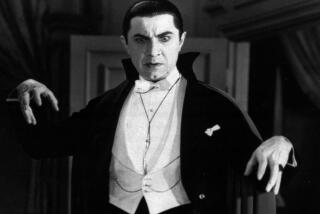Review: âClive Barker: The Painter, the Creature, and the Father of Liesâ
A collection of a writerâs prefaces and random prose pieces often feels like the mustard-stained bread crusts on a childâs plate after lunch. Nutritive quality? Low. Value? Marginal. Overall response? Ugh.
That verdict, fortunately, doesnât apply to all collections, especially one by Clive Barker, a writer perhaps best known for his âHellraiserâ story and âAbaratâ saga. His thoughtful musings on horror and culture have been collected in âClive Barker: The Painter, the Creature, and the Father of Lies.â
As varied and unexpected as this material is â editors Phil and Sarah Stokes have culled material from the last 25 years not just from books and reissues but also from DVDs and press materials â thereâs still a theme that manages to run throughout. It involves two c-words: creation and calling.
âI am not the man I was,â Barker explains in a brief foreword dated earlier this year. âThen again, who is? We change and develop. We are stirred and troubled by different events; even broken and rebuilt as experiences form our personal reefs.â
That may be true philosophically or even just mathematically (Barkerâs 58 now), but this collection also shows how some things donât change: issues that concern him now troubled him just as much early in his career.
When he laments over âthe wretched banalities of life as it is barely lived in this over-polished, but under-nourished virtual worldâ in the year 2011, it echoes something he wrote in the 1980s when he published âClive Barkerâs Books of Blood.â At that time he was just as irked by cultural mores and customs, complaining (in a previously unpublished introduction) that âwe invent rituals (Mass, reason, Freud) to keep [fear] at bay. ⌠Sooner or later, it comes. Better then, wiser then, to go and meet it, head on, see it for what it is, with all its terrors intact.â
A horror writer as social commentator? The point of the genre was to provide entertainment, escape, and scare the hell into us. This collection argues the contrary, giving us Barkerâs aesthetic concerns as well as showcasing his painterly hand with a series of black-and-white sketches that seem Goya-inspired (to this untrained eye, at any rate).
Horror writers, probably more than others, get condemned for the shock value, violence, gore and obscenity of their work â Barker has earned a few of these criticisms over his career â but often, he points out in the 1991 piece âOn Censorship,â the genre is âvery often judged by the worst of its examples.â A grotesque shock or two is sometimes needed to wake people up, and thatâs often the intent of the genreâs best writers, especially someone who âknows his Milton as well as he knows his de Sade.â Thatâs how Barker refers to one of his most recognizable characters, âHellraiserâsâ Pinhead â and it applies equally well to him.
A 2002 advance reading copy of âAbaratâ includes a note from Barker explaining his desire to create âa world of limitless horizonsâ inspired by his love of the Oz and Narnia books. (The next installment in that series, by the way, âAbarat: Absolute Midnight,â comes out this fall.) His appreciation of other horror and fantasy writers doesnât involve only the deceased ones: In a 2005 piece in Time magazine, âCornelia Funke: The Next J.K. Rowling?,â Barker celebrates the author of âInkheartâ for her âmoody unpredictable characters, and the instinctive feel of her plots, which are happily devoid of emotional manipulation.â
Much of the book is devoted to the âHellraiserâ saga and the novel that spawned it, âThe Hellbound Heart.â But there are plenty of other pieces here showcasing his philosophical musings on personal identity (âour lives are scattered throughout with periods of unbelongingâ) and poetic meditations on why a writer decides to write horror tales: âWe all hear the call of the dark once in a while: a siren song, inviting us to take a ghost ride into nightmare.â And at other times, Barker is just very candid about what horror writers do: âWe spend our working days making traps ⌠that will corner the reader into confronting ⌠experiences most of humanity spends its time assiduously avoiding.â
The energy and candor he brings to these pieces make this collection hardly an afterthought. In fact, itâs a provocation to read him if you havenât and surrender yourself to one of those cunning traps.
More to Read
Sign up for our Book Club newsletter
Get the latest news, events and more from the Los Angeles Times Book Club, and help us get L.A. reading and talking.
You may occasionally receive promotional content from the Los Angeles Times.








